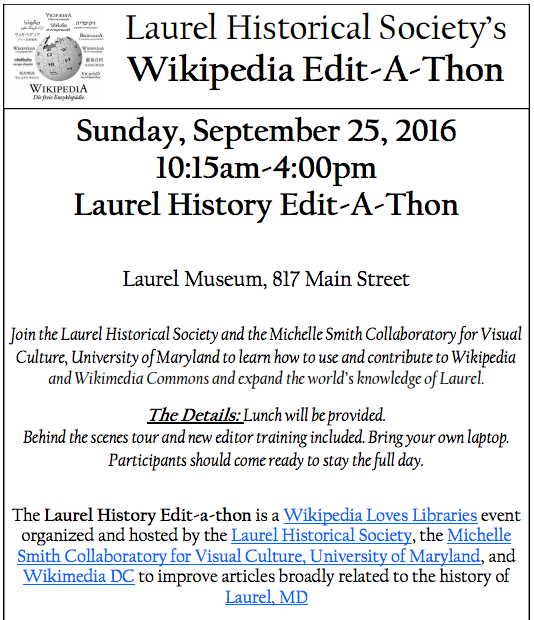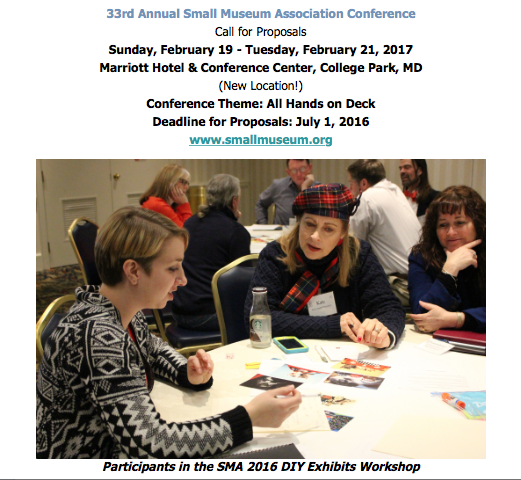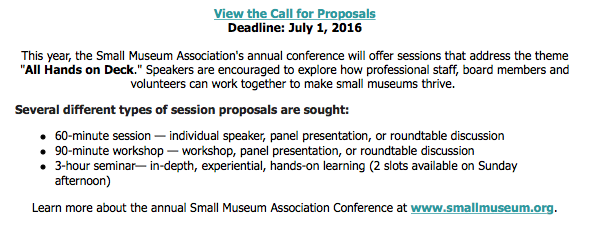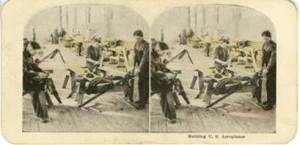Symposium on Museum Scholarship and Material Culture of Prince George’s County: Starting the Conversation
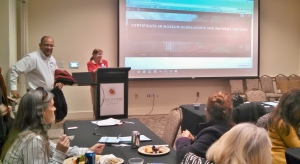
Dr. Judith Freidenberg gives opening remarks at the Symposium
This past Tuesday, Dec. 8th, the MSMC Certificate held a symposium to discuss ways in which the University of Maryland and museum and cultural organizations in Prince George’s County can better collaborate. It was well attended with over 35 participants representing over 20 museums and cultural organizations in the county.
The following notes provide a summary of topics discussed and key points made by speakers and attendees, followed by a reflection of the event by one of the Certificate students.
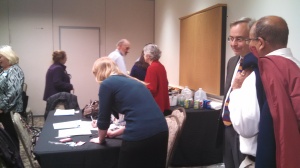 Dr. Judith Freidenberg, Director of the Museum Scholarship and Material Culture Graduate Certificate program at the University of Maryland opened the evening with remarks about the purpose of the symposium. She highlighted the importance of creating stronger links between the University and the cultural and museum organizations in the county, especially for the Museum Certificate students who are preparing to enter the field as new professionals. Dr. Freidenberg also explained that this will be a conversation about “how to best work collectively to address common issues and problems.”
Dr. Judith Freidenberg, Director of the Museum Scholarship and Material Culture Graduate Certificate program at the University of Maryland opened the evening with remarks about the purpose of the symposium. She highlighted the importance of creating stronger links between the University and the cultural and museum organizations in the county, especially for the Museum Certificate students who are preparing to enter the field as new professionals. Dr. Freidenberg also explained that this will be a conversation about “how to best work collectively to address common issues and problems.”
Four speakers addressed symposium participants beginning with Dean Gregory Ball of the College of Behavioral and Social Sciences at the University of Maryland. Dean Ball spoke of his support of this event, having grown up in Prince George’s County and fondly remembering museum experiences.
Dean Ball said,“universities and museums are significant cultural institutions which can change the conversation” and incorporate new methods into museums and academia.
Susan Pearl, Historian with the Prince George’s County Historical Society gave a brief history of the county, drawing on the rich cultural outlets since its founding. Cities like Upper Marlboro, Bladensburg, Piscataway, and College Park have had a long history of theater, art, musical performance, and exhibits which continue to thrive today.
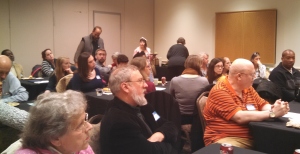 The rich history and culture in the County that Mrs. Pearl described was echoed by John Peter Thompson, Chair of the Prince George’s County Historic Preservation Commission. He spoke about the county’s over 500 historic sites which provide opportunities to explore many aspects of the county’s cultures and history. He spoke highly of the resources at the Prince George’s Historical Society library open to anyone and located in the Greenbelt Library building with special collections pertaining to the county and beyond.
The rich history and culture in the County that Mrs. Pearl described was echoed by John Peter Thompson, Chair of the Prince George’s County Historic Preservation Commission. He spoke about the county’s over 500 historic sites which provide opportunities to explore many aspects of the county’s cultures and history. He spoke highly of the resources at the Prince George’s Historical Society library open to anyone and located in the Greenbelt Library building with special collections pertaining to the county and beyond.
Aaron Marcavitch, Director of Maryland Milestones, described the importance of “Heritage areas” as cultural landscapes created to preserve the meaning of these spaces without owning or restricting the land. He engaged participants to consider the benefits of making tourism work for the small and sometimes remote museums and organizations in the county.
Think about local museums and organizations as an alternative form of recreation to mainstream tourist locations in Washington, DC., he exhorted.
The speakers set the tone for the conversations that happened around each table of symposium participants. Issues discussed included:
- How to better represent the diversity of the County’s history?
- Addressing the transient population within the county
- Engaging stakeholders – getting people to care about and invest in cultural organizations
- Leveraging County projects like new construction and transportation outlets to get better signage for smaller museums
- How to better work with the public schools
- Uniting museum “Friends Groups” to discuss shared challenges
- Acknowledging what museum staff don’t know in order to address gaps
- Creating new ways to track visitors
- Better awareness of home school opportunities – bulletin boards, parent groups, brochures, as field trip sites
- Use social media to connect with broader audiences outside of the museum spaces

Once groups shared their conversations about common issues, Dr. Freidenberg asked
“What are your organizations are good at? How can we use these successes to help each other?”
Some responses included:
Then the discussion led to ideas about improving communication and resource access between the University of Maryland, College Park and the County museums and organizations. Comments included:
- How to connect students with organizations for class projects and internships
- The Prince George’s Historical Society reported 5 graduate students working on projects through word-of-mouth references
- Can county organizations have access to University library resources?
- Two-way sharing between individual organizations and the Museum Certificate program via website (umdmuseumcert.wordpress.com).
- Announce events, internships, write a guest post about an important topic, or contribute an exhibit review, etc.
- Contact the Museum Certificate program about hosting the Certificate’s graduate class on a tour of your museum, or hosting a graduate student for their practicum project.
Reflection from a Student
Sarah Janesko
Masters of Applied Anthropology Student
Museum Scholarship and Material Culture Certificate student
Class of 2016
This event was successful in bringing people together in a single room to talk about relevant issues. It was successful because everyone who attended cares about their organization and community. It was successful because participants were not afraid to talk about what is lacking in their organizations, and about what goes right.
There is a lot to be said for the presence of University faculty, a dean, students and local museum and material cultural professionals starting a conversation together in one room. However, big issues were discussed that can’t be easily solved in 2 or 3 hours. Getting to “success” in the long-term will involve action by all parties to continue the conversation.
It felt similar to our seminars as part of the Certificate program. Students discuss scholarship issues around the classroom table and then visit museums and talk to the directors and curators about how they handle community partnership, collections management, accessibility, diversity and many other issues. Understanding how different museums implement the scholarship in their daily work and programs is critical to reproducing those successes elsewhere.
Hopefully, this is what the Symposium has started with the museums in Prince George’s County – thinking about 1) what programs, initiatives and goals were successful, and 2) the ways to receive help from and 3) give help to other museums and organizations working toward similar goals.
Has your school, organization, museum, historical society had luck with partnerships like this? What made them successful in the long-run?

